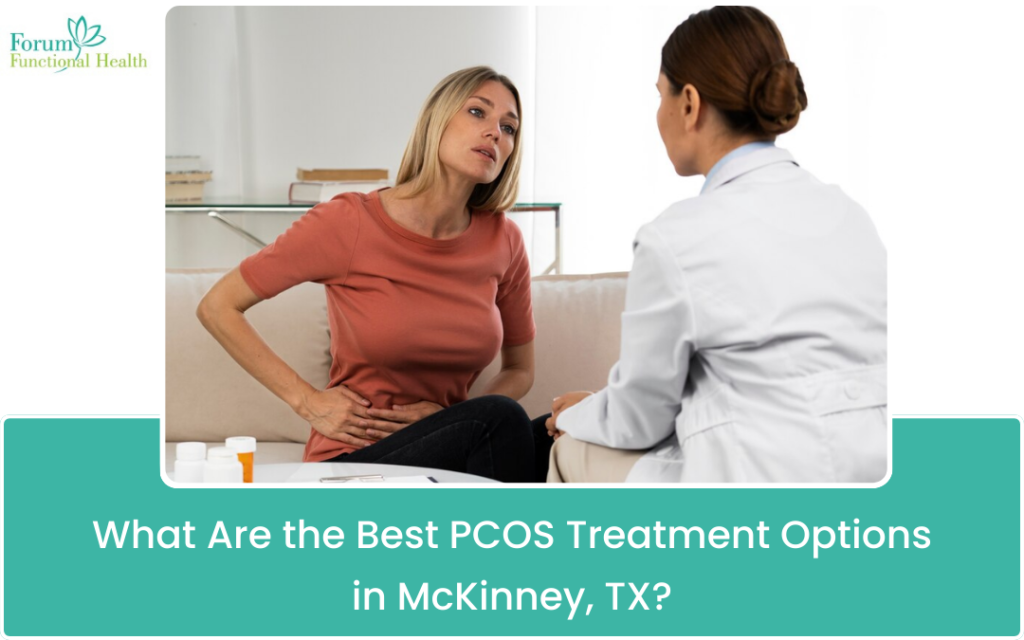What Are the Best PCOS Treatment Options

Polycystic ovary syndrome (PCOS) is a common hormonal disorder that affects many women of reproductive age. It can bring a range of symptoms, including irregular periods, weight gain, acne, and infertility, which can profoundly impact one’s physical and emotional well-being. If you’re searching for effective Polycystic ovary syndrome (PCOS) Treatment in McKinney, TX, you’re not alone. Many women face similar challenges, and finding the right support can make all the difference.
In this blog post, we’ll explore the best treatment options available at the Forum Functional Health Center, a leading Functional Health Center in Texas, dedicated to providing personalized care and support for women battling PCOS.
Understanding PCOS: A Holistic Approach
Before delving into treatment options, it’s crucial to understand what PCOS is and how it affects your body. PCOS is characterized by hormonal imbalances that can lead to metabolic issues. Women with PCOS often experience insulin resistance, which makes weight management more challenging. It’s important to address these hormonal imbalances holistically to achieve lasting results.
At the Forum Functional Health Center, we believe in treating the root causes of PCOS rather than just managing symptoms. Our approach combines traditional and alternative therapies, ensuring comprehensive care tailored to your needs.
- Nutritional Therapy: Fueling Your Body Right
Nutrition plays a pivotal role in managing PCOS symptoms. A balanced diet can help regulate hormones, improve insulin sensitivity, and support overall health. At the Functional Health Center in Texas, we emphasize the importance of whole foods, focusing on:
- Lean Proteins: Include chicken, fish, beans, and legumes.
- Healthy Fats: Incorporate avocados, nuts, and olive oil.
- Fiber-Rich Foods: Eat plenty of fruits, vegetables, and whole grains to aid digestion and regulate blood sugar levels.
Working with a nutritionist can help you create a personalized meal plan that addresses your health goals while considering your lifestyle preferences.
- Exercise: Movement for Hormonal Balance
Physical activity is another critical component in managing PCOS. Regular exercise helps maintain a healthy weight, improves insulin sensitivity, and reduces stress levels. At the Forum Functional Health Center, we recommend incorporating a mix of:
- Cardiovascular Exercises: Walking, running, and cycling can help burn calories and improve heart health.
- Strength Training: Building muscle mass boosts metabolism, making it easier to manage weight.
- Mind-Body Practices: Yoga and Pilates can reduce stress and promote hormonal balance, creating a holistic approach to your treatment.
Even small changes, like taking daily walks or engaging in group classes, can make a significant difference in how you feel physically and emotionally.
- Hormonal Treatments: Regulating Your Cycle
For many women with PCOS, hormonal treatments are necessary to regulate menstrual cycles and address other symptoms. Common options include:
- Birth Control Pills: These can help manage irregular periods and reduce acne and excess hair growth.
- Hormonal Therapies: Medications like spironolactone can help manage symptoms by addressing hormonal imbalances.
- Fertility Treatments: If you’re struggling with infertility, treatments like Clomiphene citrate may be recommended.
At the Forum Functional Health Center, we offer individualized hormonal assessments to determine the best treatment options for your specific situation.
- Supplements: Supporting Your Health Naturally
Certain supplements can provide additional support for women with PCOS. Some popular options include:
- Inositol: Known to improve insulin sensitivity and ovarian function.
- Omega-3 Fatty Acids: These can help reduce inflammation and improve heart health.
- Vitamin D: Often deficient in women with PCOS, Vitamin D is essential for hormone regulation.
Before starting any supplement regimen, it’s important to consult with a healthcare professional to determine what is right for you.
- Stress Management: Finding Your Balance
Living with PCOS can be emotionally challenging, and managing stress is crucial for overall well-being. Stress can exacerbate hormonal imbalances, making it essential to find effective coping strategies. Consider incorporating practices like:
- Mindfulness and Meditation: These techniques can help calm your mind and reduce stress.
- Therapy or Support Groups: Connecting with others who understand your struggles can provide emotional support and guidance.
- Journaling: Writing about your experiences can help you process emotions and reflect on your journey.
The Forum Functional Health Center offers resources and workshops focused on stress management, providing you with tools to navigate the emotional challenges of PCOS.
- Personalized Care: Your Journey to Health
At the Functional Health Center in Texas, we understand that each woman’s experience with PCOS is unique. Our team is dedicated to providing personalized care that addresses your specific needs. We take the time to listen to your concerns and work collaboratively to develop a comprehensive treatment plan that empowers you to take charge of your health.
Conclusion: A New Beginning Awaits
Finding the right Polycystic ovary syndrome (PCOS) Treatment in McKinney, TX, can be a transformative journey. At the Forum Functional Health Center, we are committed to supporting you every step of the way. Our holistic approach, focusing on nutrition, exercise, hormonal balance, and emotional well-being, can help you reclaim control over your health and live your best life.
If you’re ready to explore your treatment options, we invite you to contact us today. Your journey to improved health and well-being starts here!
For more information, visit our website: Forum Functional Health Center, and learn about our Polycystic ovary syndrome (PCOS) Treatment in McKinney, TX. Let us help you take the first step towards a healthier, happier you! Contact Froum Functional Health in Mckinney, TX.
Read More: What Are the Most Effective Treatments for Thyroid Disease?
